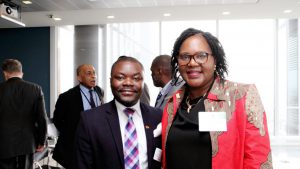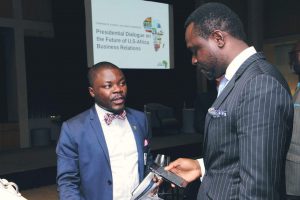By Nat Kofi Abu-Bonsrah
Last month I participated in two special events organized by the Corporate Council on Africa (CCA) on the sidelines of the United Nations General Assembly (UNGA). On September 19, Shearman & Sterling hosted a Presidential Dialogue on the Future of U.S.-Africa Business Relations, bringing together President Kigame of Rwanda, Mr. Aliko Dangote of Dangote Group, members of the Diplomatic Core from several African countries, CEO’s of major U.S. and African firms, and other key stakeholders to discuss the business environment in Africa broadly. The dialogue gave participants an opportunity to talk about key investment opportunities across the African continent and potential ways to forge U.S.-Africa business partnerships that will contribute to increase and diversify U.S.-Africa trade and investment.
Mr. Aliko Dangote, who is Africa’s richest man, told investors to take a keen look at the agricultural sector on the continent stating that “Africa will become the food basket of the world.” In addition to agriculture, Dangote cited the need to focus on manufacturing more goods locally for domestic consumption on the continent. He also acknowledged that there are challenges that need to be tackled directly when it comes to Africa, especially tribalism and corruption. He told American investors not to be lazy but rather to go to Africa and get the real story for themselves instead of relying on outdated news and wrong perceptions of the continent. He reiterated that things have changed on the continent.
President Kigame of Rwanda touted the progress his country has made over the past 17 years since he has been in power. He focused more on the corruption that has hindered growth but expressed hope on the prospects of Africa. “Corruption is not African, it’s just corruption. People have developed a misconception that corruption is the way of life in Africa. This is far from the truth,” President Kigame stated. This misperception has affected investments coming into Africa. Both panelists concluded by saying Africa should be seen as a place where you can conduct serious business, despite the challenges.
On September 20, I participated in the Forum on Advancing Health Priorities in Africa which brought together stakeholders from the private sector and public health community to discuss ways to make health a greater financial priority for countries in Africa. The keynote speaker, Dr. Mwele Ntuli Malecela who is the Director of the Regional Office for Africa at the World Health Organization (WHO), focused her speech on the UN Sustainable Development Goal (SDG) on Health. She stated that African governments are interested more in health now than ever before, therefore, there is an opportunity for great public/private partnerships when it comes to health. She contended that the WHO was vigorously encouraging partnerships with the private sector in accomplishing universal healthcare coverage for all African citizens. There was a Davos-style panel discussion after Dr. Malecela’ s statement which comprised of Betty Chiang, Senior Director, Head of Public Health & Medical Affairs, Gilead Sciences; Trevor Gunn, Vice President, International Relations, Medtronic; David Barash, Chief Medical Officer, GE Foundation; and Scott Ratzan, President, AB InBev Foundation. The panel discussion focused on implementing the correct enabling environment to ensure successful public/private partnerships.

Nat Kofi Abu-Bonsrah (left) pictured with Dr. Mwele Ntuli Malecela, Director of the Regional Office for Africa, World Health Organization
These events were a very great opportunity for me considering my passion for global affairs and human security and my love for the African continent. The insightfulness of the conversations and vast experiences of the many participants shed light on what I would like to do after I graduate from the University of Baltimore. I was able to network with key policymakers from various countries around the world while at the same time represent the University of Baltimore and the College of Public Affairs.
Nat Kofi Abu-Bonsrah is currently a student in the Global Affairs and Human Security graduate program and will graduate this December. His participation in the conferences was made possible by the College of Public Affairs’ Student Professional Development Fund.

